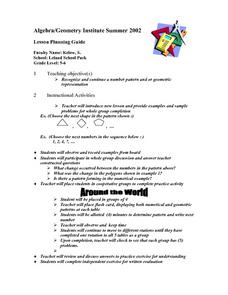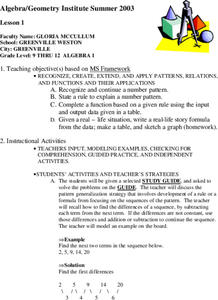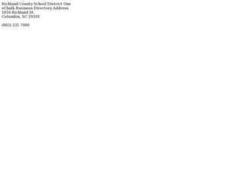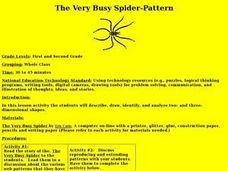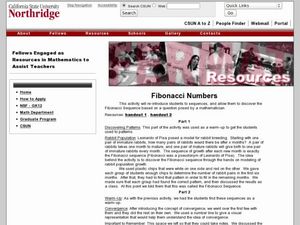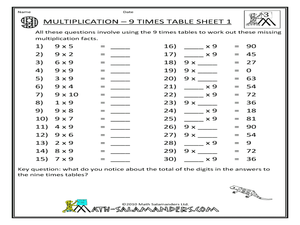Curated OER
Patterns
In this patterns worksheet, students find the missing number, shape, or letter needed for the patterns. Students complete 10 multiple choice questions.
Curated OER
Patterns and Geometric Representations
Students explore patterns and sequences. Given an example of each, they discuss their observations. In groups, students participate in an "Around the World" activity where they rotate to different stations in the classroom to determine...
Curated OER
Patterns, Relations, and Functions
Young scholars investigate the patterns of different data sets of numbers. They use critical thinking skills in order to find the missing numbers in any given set. This lesson helps to develop the skill of number sense.
Curated OER
Perplexing Patterns
Seventh graders identify and find missing patterns. In this algebra instructional activity, 7th graders investigate numbers and sequences and complete the pattern. They make a chart and discuss similarities and differences.
Curated OER
The Very Busy Spider-Pattern
Young scholars explore two- and three-dimensional shapes. For this very busy spider lesson, students read the story and then create a spider web pattern of their own. The webs must use a symmetrical pattern. Additional activities for...
Curated OER
The Three Pigs
Second graders design and construct homes for the three pigs. Each of the homes is made and filled with patterns that we explore. They continue a sequential pattern and describe a rule for this.
Curated OER
Pattern Makers
Students are introduced to the notion of a repeating pattern. This is done by a number of means including the use of everyday objects. They are encouraged to create, describe and continue patterns.
Curated OER
Pascal's Triangle
In this math worksheet, students read the discussion about the importance of games. They create a game as directed. They also read the rules for the Pascal Triangle.
Curated OER
Fibonacci Patterns
Learners solve problems using the Fibonacci Patterns. In this geometry lesson, students trackthe growing rate of a rabbit population. They collect the data and graph their results. They make predictions based on their results.
Curated OER
Related Number Pairs
Third graders use tables to organize and display related pairs of numbers, such as the relationship of the number of insects to the total number of legs. They generate a table of related number pairs based on a real-life situation,...
Curated OER
Multiply by Two, Easy Thing to Do
In this multiplication worksheet, students complete a number pattern, counting by 2 and solve 8 simple 1-digit problems. An answer key is included.
Curated OER
My Test Book: Comparing Numbers and Number Order
In this math skills worksheet, students solve 10 multiple choice math problems that require them to compare numbers and to put them in the correct order. Students may view the correct answers.
Curated OER
Multiplication: Nine Times Table
In this multiplication-nine times table learning exercise, students use the 9 times table to work out the missing multiplication facts in 30 problems, then observe a pattern in the total of the digits.
Virginia Department of Education
Mathematics Vocabulary Cards - Grade 2
Augment your math curriculum with posters detailing several concepts important to second grade math. Each poster features one math term from geometry, measurement, probability and statistics, computation and estimation, numbers and...
PBS
Working with Coordinate Planes: Assessments
It's time for scholars to show what they know about coordinate planes with a collection of three assessments. The exams' objectives include plotting points on a single grid, measuring using the distance formula, and identifying points on...
Santa Barbara City College
How to Make a Multiplication Table
Teach children how to make a multiplication table, and they'll be multiplying for life. Following this series of steps, young mathematicians learn to use patterns and the relationships between numbers to create their very own...
Concord Consortium
Bricks for Books
Maximize a profit with an understanding of geometric dimension. A real-world task challenges learners to design a pattern using three different brick shapes. The bricks are dedicated with a different donation for each shape, so part of...
Virginia Department of Education
Solving and Graphing Inequalities
You can't go wrong with a lesson plan that involves candy! Learners solve and graph one-variable inequalities and use candy to graph the solution. Individuals associate open circle graphs with life savers and closed circle graphs with...
Mathematics Vision Project
Geometric Figures
Logical thinking is at the forefront of this jam-packed lesson, with young mathematicians not only investigating geometric concepts but also how they "know what they know". Through each activity and worksheet, learners wrestle with...
West Contra Costa Unified School District
Writing Exponential Functions Based on Data
Give your class a concrete example of exponential growth and decay using this hands-on activity. These Algebra II lessons allow for the exploration of exponential growth and decay models, as well as the discovery of the patterns of each....
PBS
Working with Coordinate Planes: Activities and Supplemental Materials
Seven activities make up a collection of supplemental materials to reinforce graphing on a coordinate plane. Worksheet objectives include plotting coordinates within single and four quadrants, measuring straight and diagonal lines, and...
Willow Tree
Scatterplots and Stem-and-Leaf Plots
Is there a correlation between the number of cats you own and your age? Use a scatter plot to analyze these correlation questions. Learners plot data and look for positive, negative, or no correlation, then create stem-and-leaf plots to...
EngageNY
Advanced Factoring Strategies for Quadratic Expressions (part 1)
Factoring doesn't have to be intimidating. Build on prior knowledge of multiplying binomials and factoring simple trinomials to teach advanced factoring of quadratic expressions with a activity that uses various methods of exploring the...
CK-12 Foundation
Sum and Difference of Cubes: Stacking Blocks
Investigate polynomial factoring patterns by finding a connection to volume. As learners build a three-dimensional solid from smaller solids, they convert the visual model to a mathematical expression. Their models represent the sum of...



